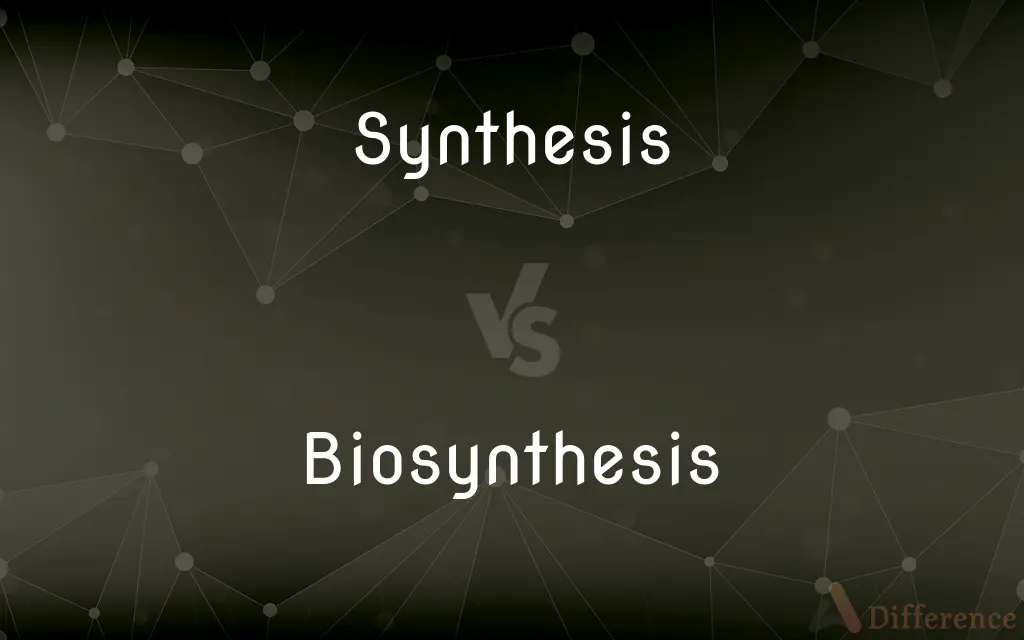Synthesis vs. Biosynthesis — What's the Difference?
By Tayyaba Rehman — Updated on October 3, 2023
Synthesis involves combining parts to form a whole, while Biosynthesis specifically refers to the formation of complex substances within living organisms. Both relate to creation but differ in application context.

Difference Between Synthesis and Biosynthesis
Table of Contents
ADVERTISEMENT
Key Differences
"Synthesis" encapsulates the act of combining various elements to generate a whole. Contrarily, "Biosynthesis" exclusively pertains to living organisms where they produce complex compounds from simpler ones, entwining biology into synthesis.
Typically, "Synthesis" is a broad term and could refer to creating any complex item or theory from simpler parts or ideas. Unlike "Synthesis," "Biosynthesis" is narrowly defined and only discusses processes of production within a biological context, particularly within an organism.
A "Synthesis" of ideas or materials doesn't necessarily involve living organisms or biological processes. In stark contrast, "Biosynthesis" implicitly involves living organisms, since "bio" implies life or living organisms, emphasizing biology-centric creation.
Chemical "Synthesis" might involve creating compounds in a lab through chemical reactions, irrespective of living organisms. "Biosynthesis," even if it involves chemical compounds, specifies that the creation of these compounds occurs within a living organism.
To elaborate further, "Synthesis" can occur in various fields like chemistry, philosophy, or music, indicating a joining of parts. However, "Biosynthesis" stays strictly in the scientific, biological realm, involving metabolic processes to form complex compounds from simpler ones.
ADVERTISEMENT
Comparison Chart
Definition
Combining to form a whole
Formation in living organisms
Application Context
General and broad
Specifically biological
Involvement of Organisms
Not necessary
Yes, mandatory
Scope
Can be applied widely
Applied in biological science
Relatability to Biology
Not specific
Direct and explicit
Compare with Definitions
Synthesis
In philosophy, synthesis can mean reconciling different theories.
His work provides a synthesis between two opposing schools of thought.
Biosynthesis
Biosynthesis is the production of complex molecules within living organisms.
Insulin biosynthesis is crucial for regulating glucose.
Synthesis
Synthesis can mean the combination of thesis and antithesis in dialectics.
The synthesis emerges more enriched than its preceding affirmations.
Biosynthesis
Biosynthesis involves enzymatic processes in cells.
Fatty acid biosynthesis occurs in the cellular cytoplasm.
Synthesis
Synthesis in chemistry is making compounds from simpler substances.
The laboratory specializes in the synthesis of rare chemicals.
Biosynthesis
Biosynthesis can be an anabolic pathway within organisms.
Amino acid biosynthesis is vital for protein formation.
Synthesis
In music, synthesis refers to generating sounds electronically.
The musician used synthesis to create unique sounds.
Biosynthesis
Biosynthesis involves forming complex substances from simpler precursors.
Cholesterol biosynthesis is pivotal for cellular membrane stability.
Synthesis
The combining of separate elements or substances to form a coherent whole.
Biosynthesis
Biosynthesis can be regulated by genetic expression.
Gene mutations can potentially alter neurotransmitter biosynthesis.
Synthesis
The complex whole so formed.
Biosynthesis
Biosynthesis is a multi-step, enzyme-catalyzed process where substrates are converted into more complex products in living organisms. In biosynthesis, simple compounds are modified, converted into other compounds, or joined together to form macromolecules.
Synthesis
(Chemistry) Formation of a compound from simpler compounds or elements.
Biosynthesis
Formation of a chemical compound by a living organism. Also called biogenesis.
Synthesis
Reasoning from the general to the particular; logical deduction.
Biosynthesis
(biochemistry) The synthesis of organic compounds within a living organism, especially the synthesis of large compounds from small ones.
Synthesis
The combination of thesis and antithesis in the Hegelian dialectical process whereby a new and higher level of truth is produced.
Biosynthesis
Production of a chemical compound by a living organism.
Synthesis
The formation of something complex or coherent by combining simpler things.
Biosynthesis
The production of chemical substances by use of reagents or enzymes derived from living organisms, in reactions modeled on those observed in living organisms.
Synthesis
(signal processing) Creation of a complex waveform by summation of simpler waveforms.
Biosynthesis
Production of a chemical compound by a living organism
Synthesis
(chemistry) The reaction of elements or compounds to form more complex compounds.
Synthesis
(logic) A deduction from the general to the particular.
Synthesis
(philosophy) The combination of thesis and antithesis.
Synthesis
(military) In intelligence usage, the examining and combining of processed information with other information and intelligence for final interpretation.
Synthesis
(rhetoric) An apt arrangement of elements of a text, especially for euphony.
Synthesis
(grammar) The uniting of ideas into a sentence.
Synthesis
(medicine) The reunion of parts that have been divided.
Synthesis
Composition, or the putting of two or more things together, as in compounding medicines.
Synthesis
The art or process of making a compound by putting the ingredients together, as contrasted with analysis; thus, water is made by synthesis from hydrogen and oxygen; hence, specifically, the building up of complex compounds by special reactions, whereby their component radicals are so grouped that the resulting substances are identical in every respect with the natural articles when such occur; thus, artificial alcohol, urea, indigo blue, alizarin, etc., are made by synthesis.
Synthesis
The combination of separate elements of thought into a whole, as of simple into complex conceptions, species into genera, individual propositions into systems; - the opposite of analysis.
Analysis and synthesis, though commonly treated as two different methods, are, if properly understood, only the two necessary parts of the same method. Each is the relative and correlative of the other.
Synthesis
The process of producing a chemical compound (usually by the union of simpler chemical compounds)
Synthesis
The combination of ideas into a complex whole
Synthesis
Reasoning from the general to the particular (or from cause to effect)
Synthesis
Synthesis involves combining elements to form a whole.
The research paper was a synthesis of several studies.
Common Curiosities
What defines biosynthesis?
Biosynthesis involves living organisms producing complex molecules from simpler substances.
What is synthesis?
Synthesis refers to combining various components to create a unified whole.
How is synthesis applied broadly?
Synthesis can be applied in various contexts, such as chemical production, philosophical ideas, or music.
Can synthesis involve biological processes?
While synthesis can involve biological aspects, it is not specifically confined to biological contexts like biosynthesis.
Does biosynthesis occur outside of organisms?
No, biosynthesis specifically pertains to processes within living organisms.
Is synthesis specific to any scientific domain?
No, synthesis is a broad term and can be used across various scientific and non-scientific domains.
Can biosynthesis be manipulated?
Yes, scientists can manipulate biosynthesis through genetic engineering or by altering metabolic pathways.
Is biosynthesis always natural?
Biosynthesis naturally occurs in organisms, though it can be studied and modified in lab settings.
How is synthesis different from combination?
Synthesis involves creating a unified whole with intentional design, while combination might lack a deliberate arrangement or design.
Is biosynthesis a type of synthesis?
Yes, biosynthesis can be considered a specialized type of synthesis occurring within living organisms.
What does biosynthesis yield?
Biosynthesis typically yields complex molecules essential for the organism's function and survival.
Is synthesis relevant in music?
Yes, synthesis in music refers to electronically combining or creating sounds.
Can synthesis occur in a lab?
Yes, synthesis, especially chemical synthesis, commonly occurs in laboratory settings.
Share Your Discovery

Previous Comparison
Motility vs. Mobility
Next Comparison
Cape vs. CloakAuthor Spotlight
Written by
Tayyaba RehmanTayyaba Rehman is a distinguished writer, currently serving as a primary contributor to askdifference.com. As a researcher in semantics and etymology, Tayyaba's passion for the complexity of languages and their distinctions has found a perfect home on the platform. Tayyaba delves into the intricacies of language, distinguishing between commonly confused words and phrases, thereby providing clarity for readers worldwide.
















































